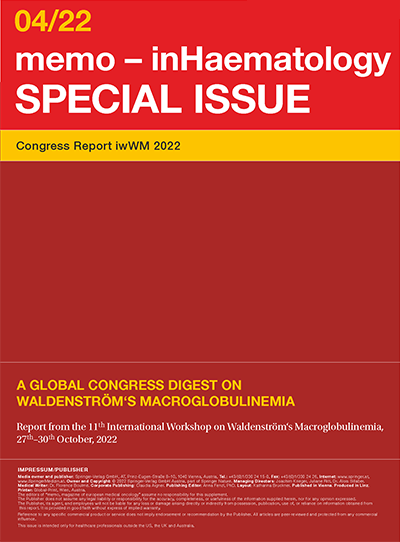iwWM 2022 – Madrid, hybrid
Lecture Board: Xinxin Cao, MD; Amy Christian, MSc; Constantine S. Tam, MBBS, MD; Ibrahim Tohidi-Esfahani, MD; Shuhua Yi, MD
Medical Writer: Florence Boulmé, PhD
Publishing Editor: Anna Fenzl, PhD
Preface – iwWM 2022
Preface – iwWM 2022 © author’s own - Efstathios Kastritis, MD, Plasma Cell Dyscrasia Unit, Department of Clinical Therapeutics, National and Kapodistrian University of Athens, Athens, Greece Dear Colleagues, The 11th International Workshop on Waldenström’s Macroglobulinemia (iwWM), held in Madrid, Spain, and virtually from 27th–30th October 2022, featured 20 sessions with more than 100 presentations. Until now, primary treatment options for WM included combination strategies with anti-CD20
New insights into BTKi treatment of Waldenström‘s macroglobulinemia
New insights into BTKi treatment of Waldenström‘s macroglobulinemia New insights into BTKi treatment of Waldenström’s macroglobulinemia Waldenström’s macroglobulinemia (WM) is a low-grade non-Hodgkin B-cell lymphoplasmacytic lymphoma, characterized by the accumulation of clonal lymphoplasmacytic cells secreting monoclonal IgM protein in the bone marrow and other organs [1]. WM is a lymphoma accounting for only 1–2 % of all hematologic tumors, with an annual incidence of three to four cases p
Management of WM patients previously exposed to BTK-inhibitors
Management of WM patients previously exposed to BTK-inhibitors Zanubrutinib in ibrutinib- or acalabrutinib-intolerant patients Many patients with WM require continuous treatment with BTK inhibitors, but difficult-to-manage AEs often lead to treatment discontinuation [1]. Zanubrutinib is a potent and selective next-generation BTKi designed to minimize off-target kinase binding and associated side effects [2, 3]. Randomized phase III studies have shown that, in patients with chronic lymphocyti
BTK inhibition in Waldenström’s macroglobulinemia: trial updates and biomarker analysis
BTK inhibition in Waldenström’s macroglobulinemia: trial updates and biomarker analysis BTK inhibition in Waldenström’s macroglobulinemia: trial updates and biomarker analysis The open-label, multicenter, randomized phase III ASPEN trial was set up to assess the efficacy and safety of the potent, selective, irreversible next-generation BTK inhibitor zanubrutinib in Waldenström’s macroglobulinemia (WM). Cohort 1 of the study included patients with MYD88-mutated disease (n = 201); here, zanubr
Emergent BTKi treatments in WM
Emergent BTKi treatments in WM Additionally to ibrutinib, to date the only once-daily BTK inhibitor approved in the USA and the European Union either as monotherapy or in combination with RTX for patients with WM [1], other BTKis, such as acalabrutinib and zanubrutinib, are now emerging as potential therapeutic alternatives. Acalabrutinib in treatment-naïve or R/R patients Acalabrutinib is an emergent, potent, and selective BTKi, which has received accelerated approval by the US FDA for the t
Latest updates on BTKi-treatment in WM
Latest updates on BTKi-treatment in WM Long-term BTKi monotherapy Ibrutinib monotherapy is approved for all lines of therapy in patients with WM, although its initial trial was focused on patients who relapsed, only (NCT01614821) [1]. Thus, clinical research on the use of ibrutinib monotherapy in the frontline setting of WM is warranted. At this year’s iwWM congress, Jorge Castillo presented long term data (4 years) of ibrutinib monotherapy in treatment-naïve WM patients [2]. In this investi
EXPERT VIDEOS
All video interviews from iwWM 2022
Roger Owen discusses whether the choice of BTK-inhibitor matters, what clinical data tell us about the long-term performance of acalabrutinib and talks about the different association of ibrutinib and zanubrutinib with efficacy in patients with Waldenström‘s Macroglobulinemia and low frequency genetic alterations while finally reflecting his highlights from the 11th International Workshop on WM especially the role of minimal residual disease as an independent predictor of patient outcomes.
Steven P. Treon explains where we are at present regarding curability of Waldenström‘s Macroglobulinemia, key questions in the management of patients with WM, genomic testing and genomically driven algorithms for the treatment of WM. Moreover, he discusses which treatments might be implemented in the future while finally summarizing his highlights from the 11th International Workshop on WM.
Jorge Castillo highlights the most relevant findings regarding chemoimmunotherapy in patients with Waldenström‘s Macroglobulinemia presented at the 11th iwWM, discusses the management of WM patients who have been exposed to covalent BTK inhibitors, explains which clinical endpoint(s) should be reached in the treatment of patients with WM and shares his thoughts on promising novel treatment approaches.





